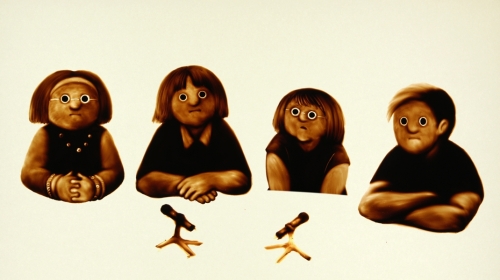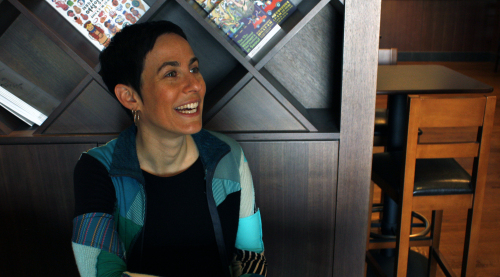Canadian director brings film about artists with Down syndrome to Women’s Film Festival
Canadian animation director Shira Avni makes films that are “in between genres.”
“Animated documentaries don’t fit into doc festivals, nor do they fit into anime festivals,” Avni told The Korea Herald in Seoul last week. “But they get invited to both.”
Her 2009 animated documentary, “Trying Your Own Shoes,” which has been officially invited to the International Women’s Film Festival in Seoul this month, is a film that explores “how it feels to be a little bit unusual.”
 |
A scene from “Trying Your Own Shoes,” an animated documentary about four real-life artists who have Down syndrome. (International Women’s Film Festival in Seoul) |
 |
Canadian animation director Shira Avni talks about her animated documentary, “Trying Your Own Shoes,” which has been officially invited to this year’s International Women’s Film Festival in Seoul, at a cafe in Seoul, April 12. (Claire Lee/The Korea Herald) |
Featuring the lives of four talented adult artists with Down syndrome ― Petra, Matthew, Katherine and Daninah ― the movie showcases the artists’ animated artworks as well as footage from interviews.
The four artists have open discussions about their families, work, relationships, sense of isolation, desires and ambitions. Their childhood memories and experiences ― some humorous, some heartbreaking ― give an intimate glimpse into what it is to grow up and live with Down syndrome.
Avni, who has been working for the National Film Board of Canada as a director and animator since 1997, has had close ties to people with Down syndrome for the last 20 years.
It started when Avni, who grew up in Montreal, joined an experimental education program that involved working with people with disabilities when she was a teenager.
Since then, Avni has formed a special attachment to people with Down syndrome, as she was deeply touched by their genuine enthusiasm and love for life.
“Everyone I know ― who has Down syndrome ― has a great sense of humor,” Avni told The Korea Herald. “When you have a sandwich with them, it’s always the best sandwich in the world. They are always happy but not in a simplistic way ... They just live for the moments.”
Her last animated memoir, “John and Michael,” a tender love story between two men with Down syndrome, was also based on a true story.
“I love art in general but I’m personally really interested in art that communicates something that’s meaningful,” Avni said. “Things that are political or personal or emotionally moving.”
Avni said while she also loves conventional documentaries, animated documentaries offer a new and creative way of producing non-fiction films. And they certainly work well with the types of stories Avni wants to tell.
“I think that where animated documentary comes in is where you are telling either really personal stories or you are illustrating things like memory, inner emotions, states of mind, and historical events where you don’t have documentary footage to use.”
The genre also makes it possible to tell difficult stories without endangering or stigmatizing the subject, Avni said. These subjects would include children of illegal immigrants, people who are HIV-positive, political prisoners and refugees, who would risk their safety by speaking on-camera.
“Rather than doing a live action, fictionalized reenactment, you can work in consultation with the subject to create something that really represents their thoughts,” she said. “So their voice still gets out and their message still gets out without revealing their identities.”
Avni said the main purpose of “Trying Your Own Shoes” is to show how often we underestimate the marginalized in our society.
“The film shows three strong women who are really talented, have overcome obstacles, and successful in their way,” Avni said. “I think they can be inspiring. They show people who are considered not equal in society can do things that are really amazing.”
By Claire Lee (
dyc@heraldcorp.com)









![[Today’s K-pop] Blackpink’s Jennie, Lisa invited to Coachella as solo acts](http://res.heraldm.com/phpwas/restmb_idxmake.php?idx=644&simg=/content/image/2024/11/21/20241121050099_0.jpg)